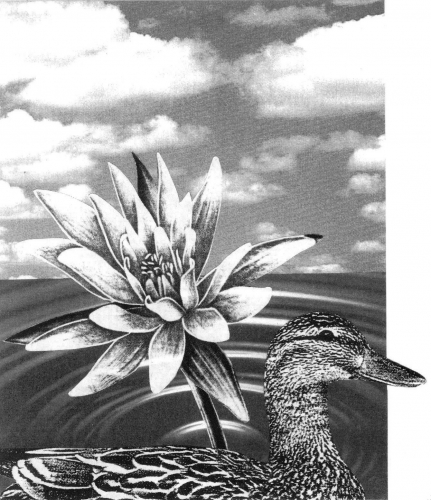The following story is based on a Chinese Buddhist scripture called Bayu-jing, or The One Hundred Parable Sutra. It was originally translated from Sanskrit into Chinese in 492 C.E. by Gunavriddi, a Buddhist teacher from central India. Translated into English for the first time by Kazuaki Tanahashi and retold by Peter Levitt, this story is part of their manuscript, “The One Hundred Parable Sutra: Stories of Ancient Fools for Today.”
The Duck Call
 On festival days in another country, a long time ago, it was the custom for women to adorn their hair with the beautiful blossoms of the water lily. On one of these occasions there was a poor man whose wife was very cross. “Get me a blossom from a water lily,” she told him, “and I will remain your wife. But if you cannot even provide me with that, I will leave you.”
On festival days in another country, a long time ago, it was the custom for women to adorn their hair with the beautiful blossoms of the water lily. On one of these occasions there was a poor man whose wife was very cross. “Get me a blossom from a water lily,” she told him, “and I will remain your wife. But if you cannot even provide me with that, I will leave you.”
It turns out that her husband had long been good at imitating the call of the mandarin duck, so he set out for the pond owned by the king. When he got there the man lowered himself into the pond, made the call of the duck so he could draw near to the water lilies without arousing suspicion, and stole a most beautiful blossom for his wife.
While the man was wading back to shore, with the prized blossom in his hand, the keeper of the pond heard something and called out, “Who is it in the pond?”
The poor man became flustered and, without thinking, he answered, “It’s a duck.”
At this, the keeper came running, caught the man, and hurried him off to face the king.
On the way there, hoping to change things around, the poor man again imitated the duck’s call. The pond keeper was astonished. “Why didn’t you do that before?” he said, shaking his head. “It’s no use doing it now.”
There are many people in the world just like this foolish man. They spend their entire lives creating trouble and harming others and no time at all training their minds and developing good virtues. Then, at the end of their lives, when they are facing death, they say, “Now I want to do good deeds and devote myself to practice.” But they are already in the grips of the jailer of hell who brings them to the King of Death. Although they may want to practice good deeds and cultivate their minds, it is no longer possible, just like the foolish man who made a duck’s call as he was being taken to the king.
Illustration by Barry Canter.
Thank you for subscribing to Tricycle! As a nonprofit, we depend on readers like you to keep Buddhist teachings and practices widely available.